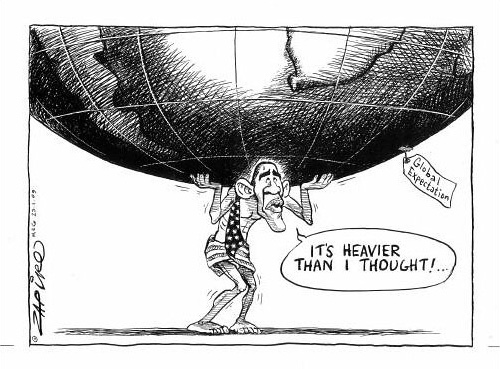Expectations: The Silent Killer of Student Success

Expectations make students feel like they have the weight of the world on their shoulder.
One day a student realized that they had fallen much further behind in school than they had anticipated and went to their teacher to figure out what to do.
The teacher told them they had two choices.
They could be given a zero on the assignment
Or sit down and talk about what was going on and figure out where to go from there.
The student quickly decided on the zero thinking it would not affect their grade too much.
As the teacher was preparing to grade the assignments, the student turned to them and asked:
“By the way, out of curiosity, what would have happened if I didn’t take the zero?”
The teacher laughed and said:
“You know, it’s funny, I offer everyone the same choice, and nearly everyone picks the zero.”
The teacher paused:
“I would have given you an extension and some extra help but it seems that so many students are afraid of not doing their best that they instead choose to give up.”
As a student I know all too well the weight that expectations bear on us all. Teachers and parents are often told to have “high expectations” for their students and children because “low expectations” have the potential to damage a student’s ability to learn. In Rosenthal and Jacobson’s Pygmalion Study, Robert Rosenthal, a Harvard Student, administered a special IQ test at an elementary school to determine what students would succeed academically in the next year. The IQ test used was only a standard test and the students who succeeded were completely chosen at random, it was the Teacher’s expectations that caused the difference within students. This experiment was called the “Oak School Experiment” and the resulting effect, that high expectancy can cause accelerated intellectual growth in not only students but also adults, was thus dubbed the “Pygmalion Effect”. While the Pygmalion effect does hold true, if your expectations for someone are too high then those expectations have also proven to become overwhelming and burdening for a person resulting in a less than desired outcome. While “expectancy effects” are apparent in many environments the results and methods cannot be held for all students around the world. The problem is with the word expectations itself and its ability to damage the relationships between students and their ability to learn.
Regis is a college prep school with high expectations for its students and pressure from parents, which is not necessarily a bad thing, but Regis also bases its success off of how many of its kids go to college and how good that college is. According to Niche, after graduation about 99% of students go on to attend a 4 year college. Instead of focusing so much on the school’s reputation, administration should be focusing on cultivating individual identities and developing a student’s ability to connect with what they’re learning so they can be better prepared for life. So many schools are so focused on what they can do to improve and maintain their reputation that the focus has shifted away from producing deep engagement and understanding in students. Students with Divergent intelligence generate creative ideas by exploring as many possible solutions in a free flowing and “non linear” manner. Students with the ability to think creatively tend to excel more than those with convergent thinking.
Regis, along with other schools and many parents, are sending the message to their kids that getting a good well-paying job and succeeding, to further their own reputation, at the expense of their mental health is okay and in fact is the correct path to follow. No level of success is worth a lifetime of unhappiness. We all need to redefine our ideas of expectations and success while reevaluating our own approaches to student success.
Parents are trying to live vicariously through their kids and put their own ambitions on their kids rather than helping students pursue their passions. Students then, at expense of their mental health, try to achieve a goal they don’t actually desire. In a survey done by Gallup, Omidyar Network, and the Bill and Melinda Gates Foundation, it is estimated that around 44% of workers believe they have “mediocre” jobs, while 16% believe they have “bad” jobs. High expectations give way for excuses and more often than not pushes students to go study and later enroll in a career that they genuinely are not interested in or have any talent in leading to many wasted opportunities for growth and regret.
As technology continues to advance studies are seeing an increase of social media usage. In 2018 Pew Research center surveyed 750 teenagers discovering that 97% of those teens, ages 12 to 17, had at least one social media platform. Social media perpetuates unrealistic views of other people’s lives as well as exposes younger students to bullying and other distractions.
According to a survey 71% of Americans classify Millenials and Gen Z as entitled, unmotivated, and self absorbed, This generation, however, is not a generation of weakness or laziness. “Low” Expectations cause fixed mindsets within students. These fixed mindsets, according to author Carol Dweck, leave very little room for change in any direction. “High” expectations produce a sense of inadequacy as well as entitlement. Working hard does not necessarily mean you will get a good grade and when you are “expected” to do something it has been perceived that there no longer is a need to acknowledge that it was done. Fixed mindsets leave younger people more prone to developing mental health difficulties causing this perceived sense of “unmotivation”.
“Remember who you are and what God expects you to become” Thomas S. Monson. Students are more than the expectations that are set for them. We are only human and we are trying to navigate through a time where it is estimated that 56% of teens and adults have begun exhibiting symptoms of depressive disorder and anxiety. We can only handle so much, and changing our ideas of our expectations is the first step to cultivating healthy coping mechanisms and setting us up for college and life in the future. Expectations play a huge role in mental health and examining and rewriting them will benefit this generation and many to come.
“A failure doesn’t mean you are unworthy , nor does it preclude success on the next try” -Leonard Mlodinow



